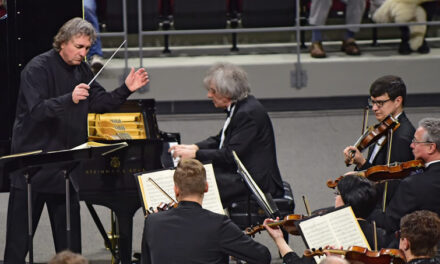Last night the Ciompi and Borromeo String Quartets brought Duke’s 2003 Summer Festival of Music to a blazing finale.Combining the forces of two excellent string quartets opens up programming possibilities that are usually closed because of the number of instruments required. Capitalizing on this advantage, the quartets performed a string sextet, a string quintet and a string octet, all infrequently performed.
Richard Strauss composed his last opera, Capriccio, in 1941, when he was 77 years old. In the midst of the horrors of the war the old man escaped into a gentle and humorous work, set in the time of Gluck, which he called “a conversation piece for music.” It is an opera on how to write – or not to write – an opera. In the prelude a composer “test drives” a string sextet he composed for a countess, with whom he is in love, with a poet who is also in love with her, and this sextet – for two each of violins, violas and cellos – has acquired a life of its own outside the opera house. A pity. Taken out of the comic setting and context, it loses some of its wit, noticeably that it is a “Tristanesque” piece with a maximum of harmonic tension and a minimum of resolution. The performers gave it a subdued and musical reading but even the excellent playing of the Ciompi Quartet augmented by violist Mai Motobuchi and cellist Yeesun Kim of the Borromeo Quartet could not make it seem like more than a disillusioned old man’s attempt to recapture a fin de siècle romanticism among the ruins of war.
Some works are seldom performed and when you hear them you realize that there is a good reason for the neglect. Anton Bruckner, who rarely touched chamber music, wrote the String Quintet in F in 1879, in the process revealing his lack of comfort with the medium. Bruckner conceived everything, including his large symphonies, with the massive organ sounds in his mind, something that works with a large symphony orchestra but just does not work with a string quintet; like his symphonies, it was also overly long for the material. This time the Borromeo String Quartet, augmented with Jonathan Bagg of the Ciompi, did their best to bring the Quintet to life with flexible tempi, dynamic shading and pregnant pauses – to no avail. It wasn’t their fault.
Things got much better after intermission. Felix Mendelssohn wrote his String Octet (for two string quartets) Op.20 at the ripe old age of 16. Most performers tend to rip through the piece with a uniform exuberance – usually a sustained forte – they attribute to the average 16-year-old, forgetting that at that age Mendelssohn, the most prodigious of child prodigies, was fast becoming a mature composer. The Ciompi and Borromeo, aware of the big picture, gave the work shape with sensitive variation in dynamics, especially emphasizing the different moods of the andante and scherzo.
Calling the work a string octet is a little misleading. It is really a mini-concerto for the first violin accompanied by everybody else. Pritchard occupied the first violin chair and gave an outstanding performance both with his playing and with his leading of the large (in chamber music terms) ensemble.
The rousing applause and even shouting brought on an encore: A Lullaby for string quartet recently composed by Mark Kuss as a gift to Eric Pritchard on the birth of his first child. Since the Kitchens also cooked up a new son in April, both quartets doubled up to honor the new arrivals.
Sadly, this was the final Duke Summerfest concert, and, despite the rains, the summer musical drought has set in.












